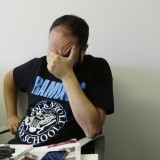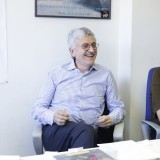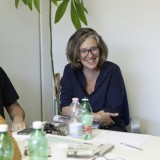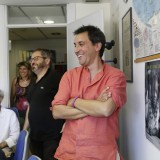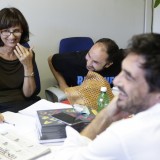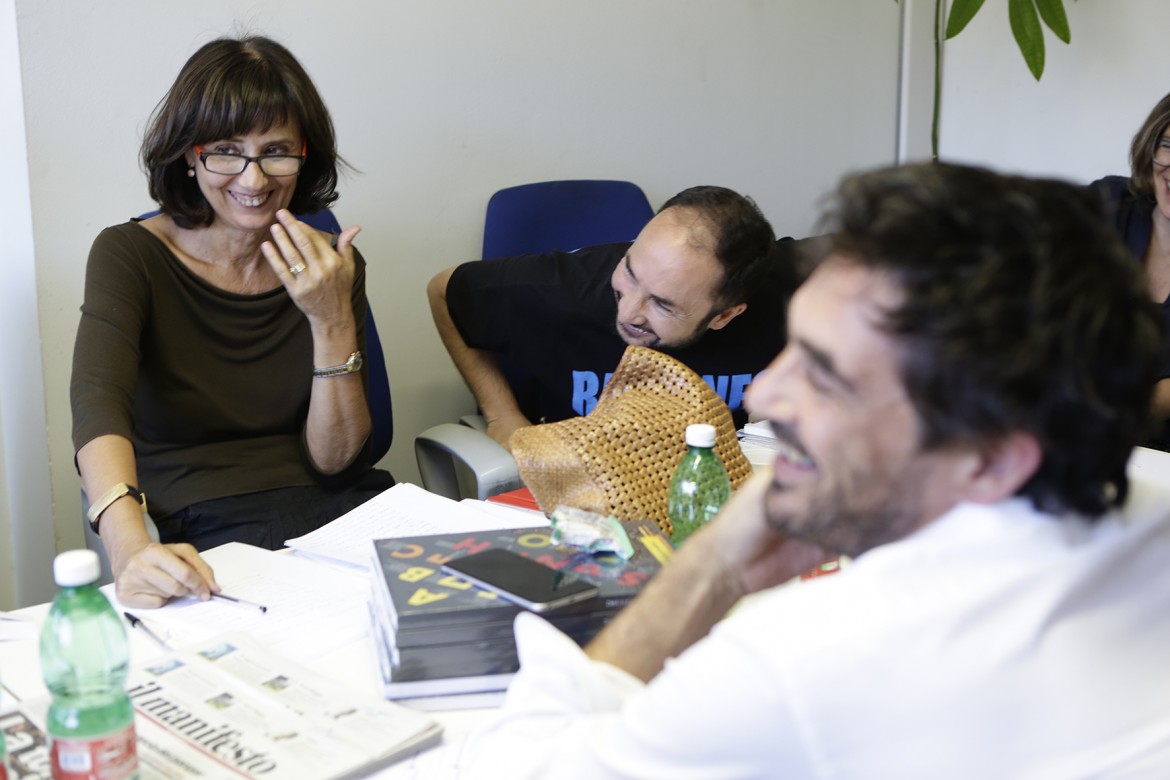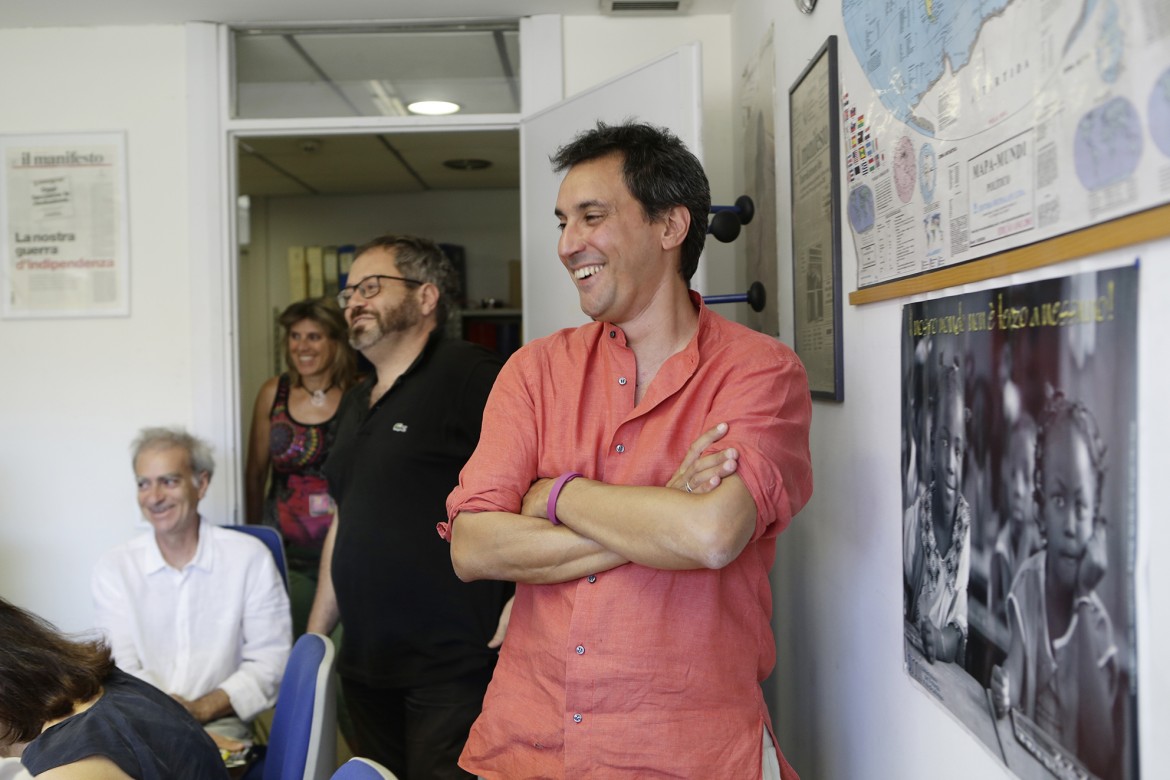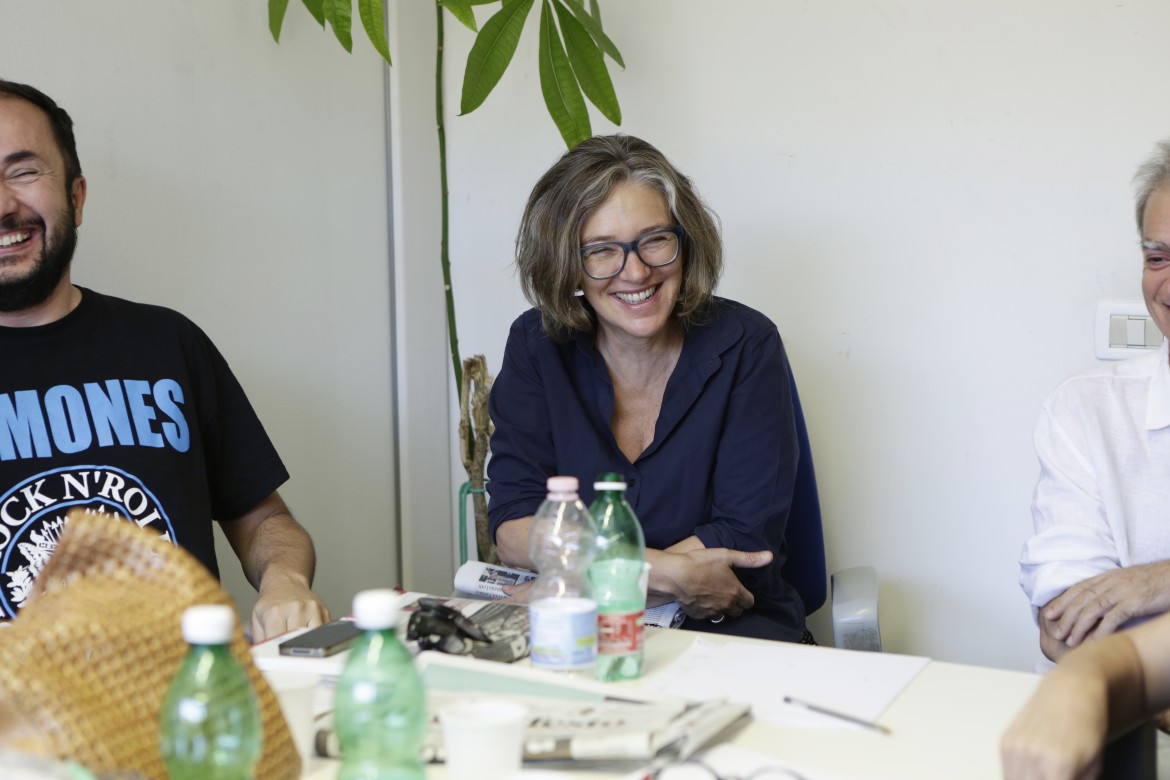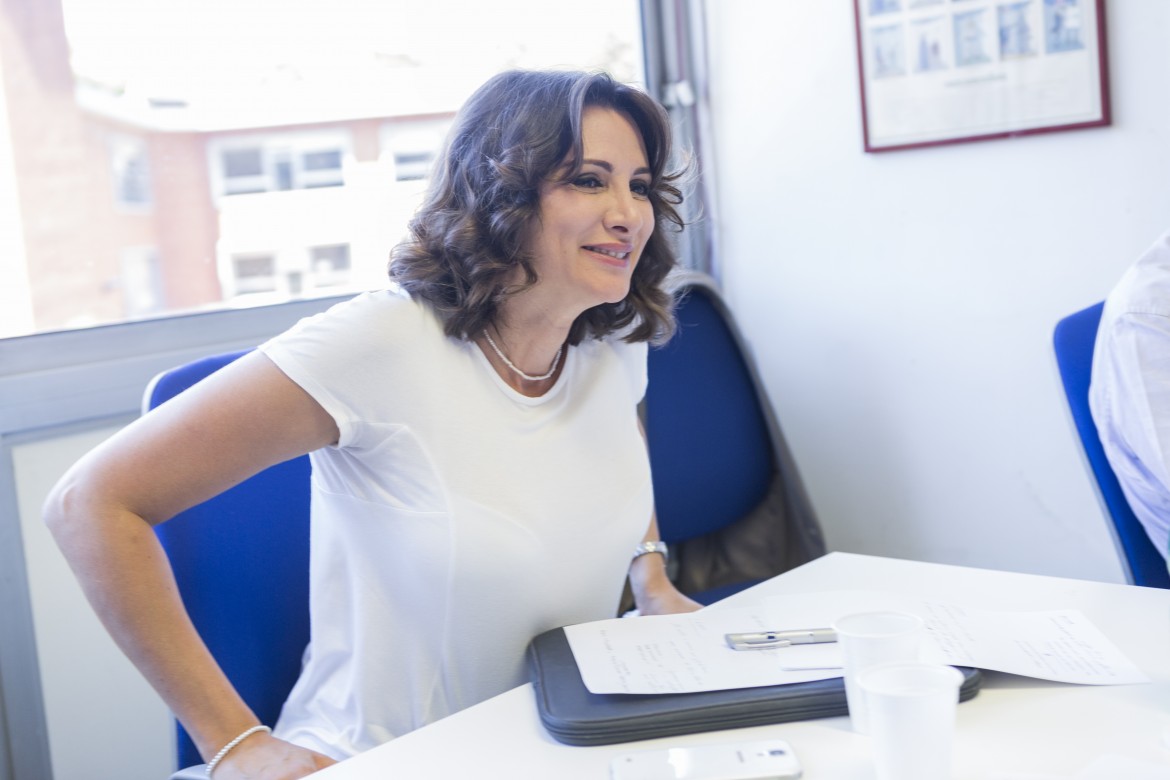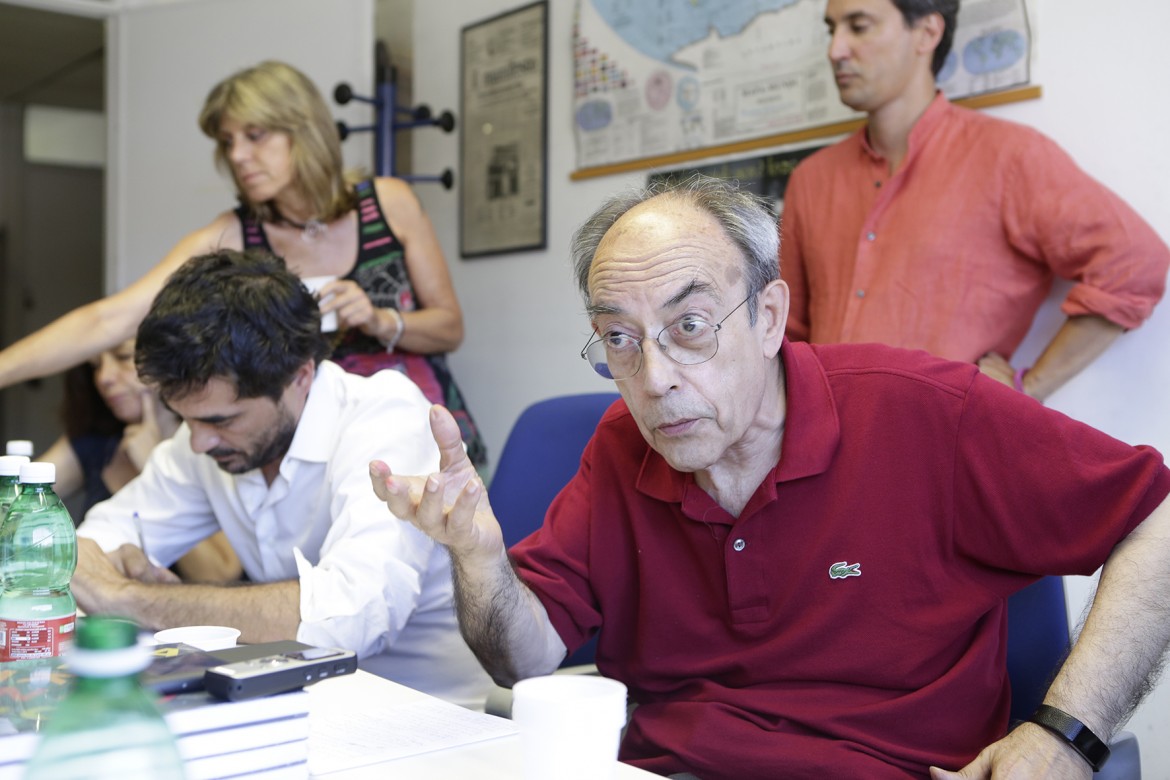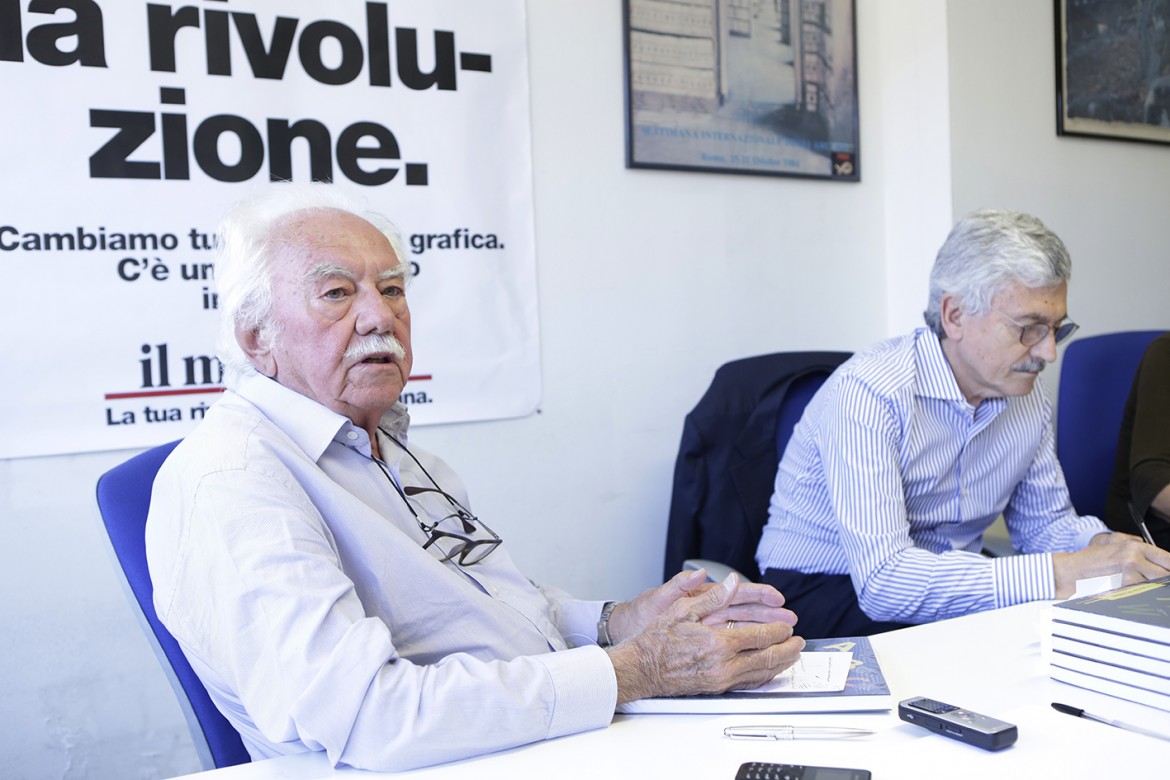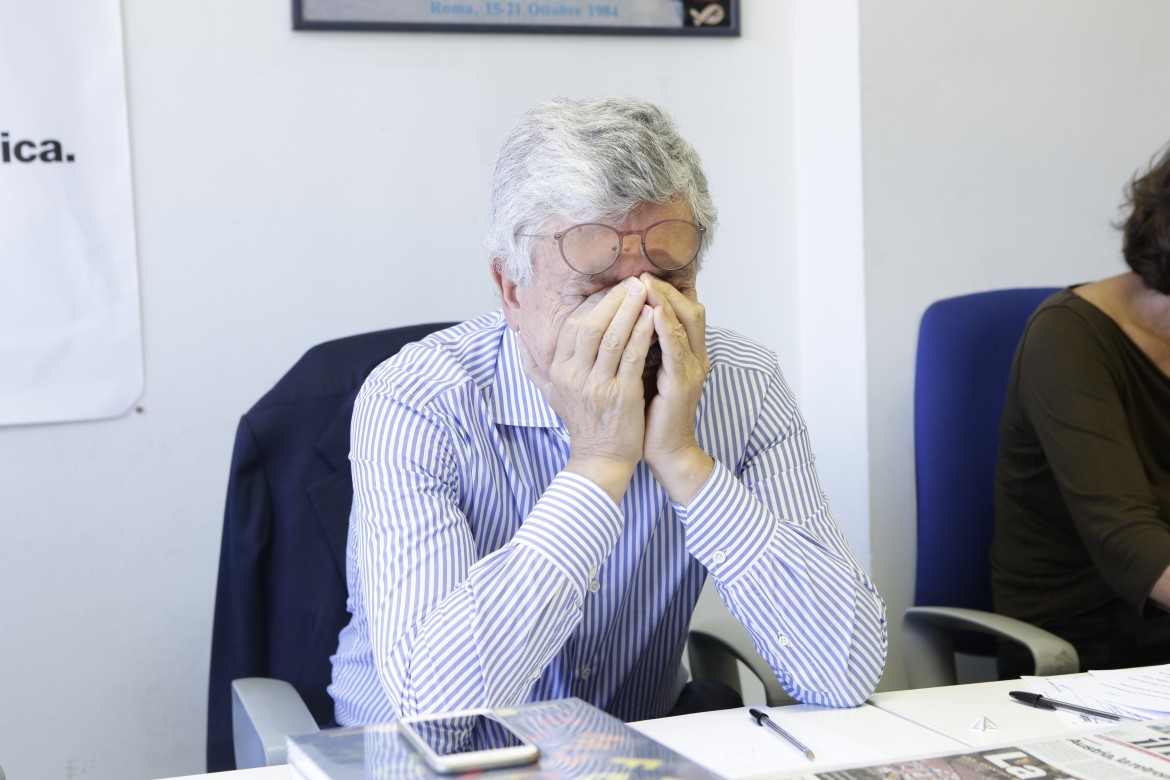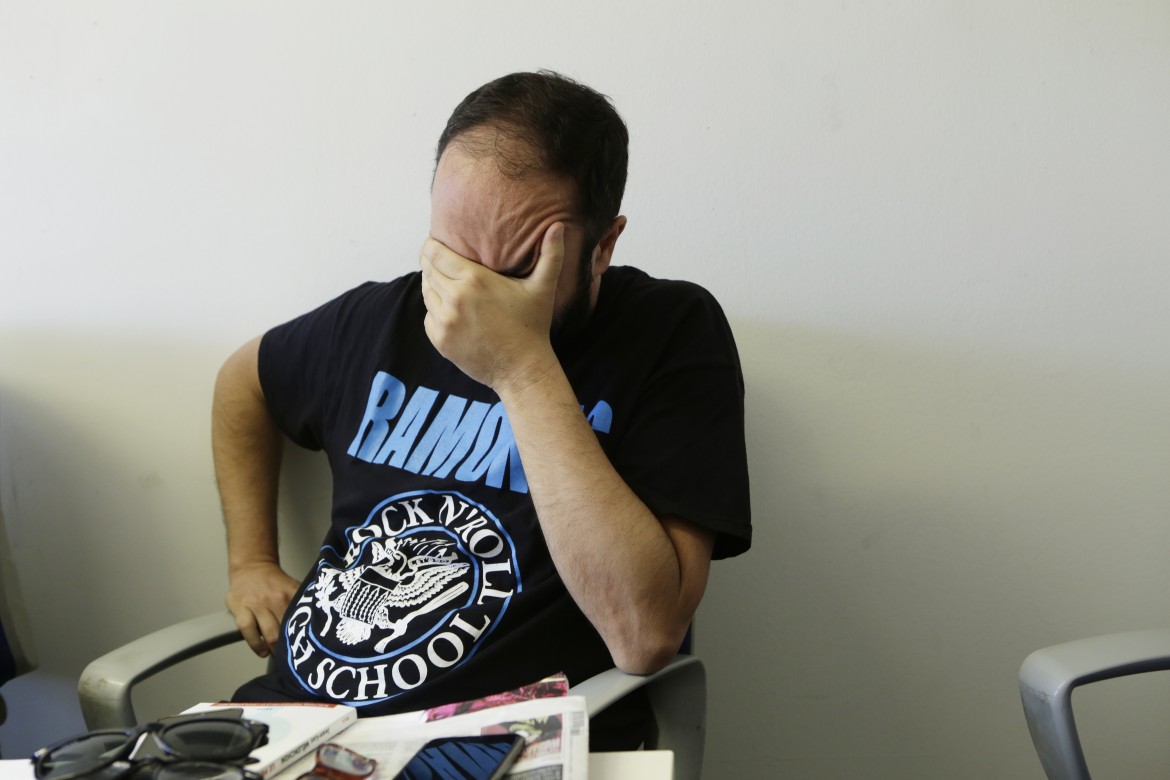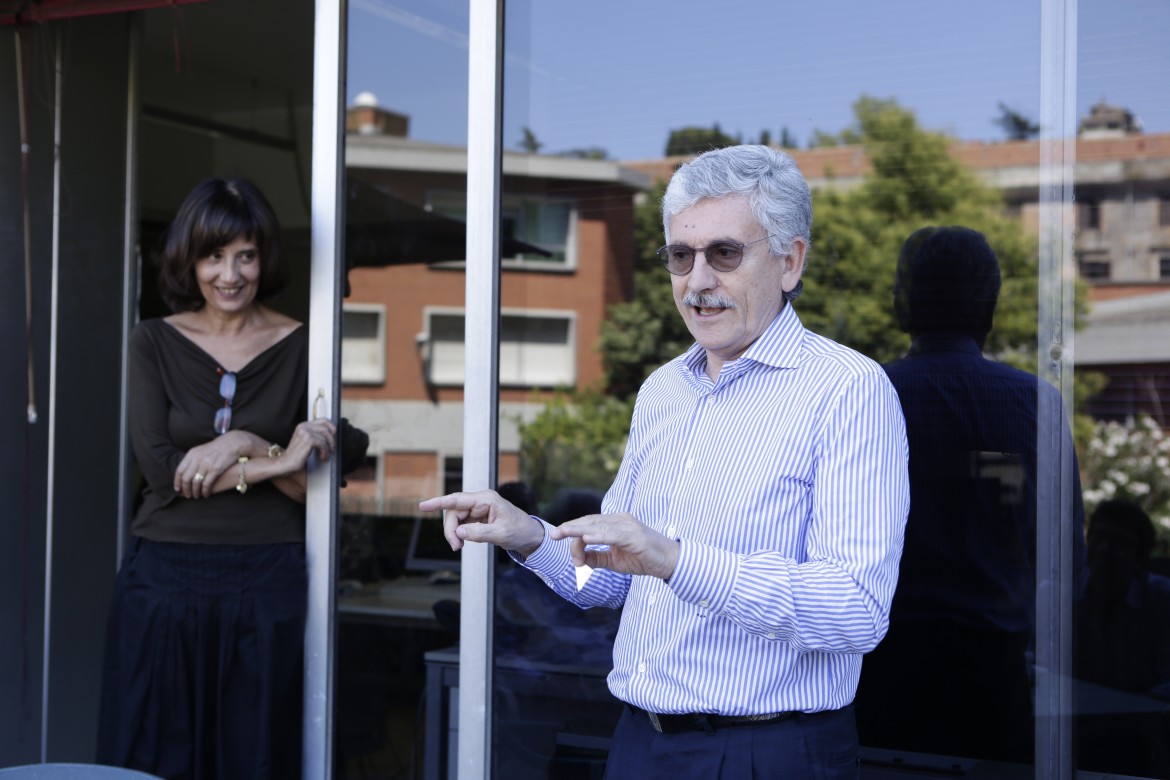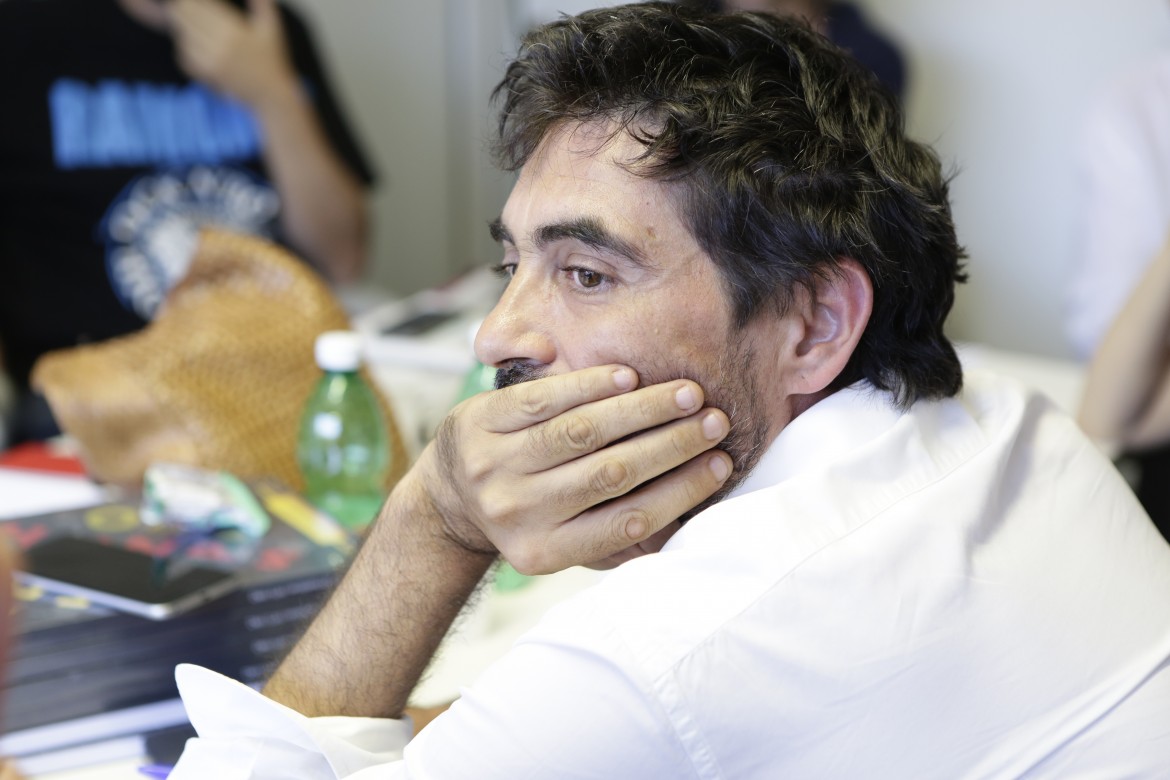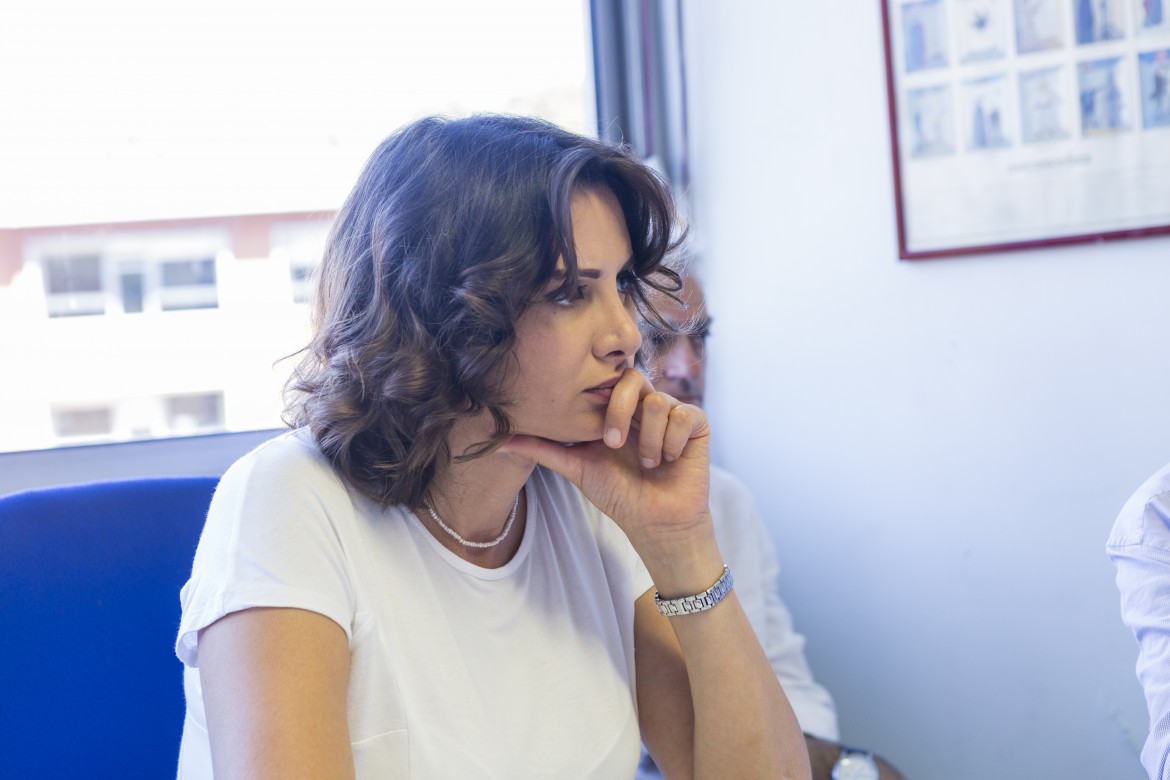Our forum with Massimo D'Alema, Nicola Fratoianni, Anna Falcone, Maurizio Acerbo, Alberto Asor Rosa and Massimo Villone
The new left is here. All that's missing is the list. The forum at il manifesto.
Identity, program, unity — speaking with those who stay put and those who changed parties. In this sensitive period before the forthcoming electoral storms, we attempt to understand whether the initiatives at Teatro Brancaccio and Piazza Santi Apostoli have isolated the protagonists of the left or have otherwise shuffled the deck.
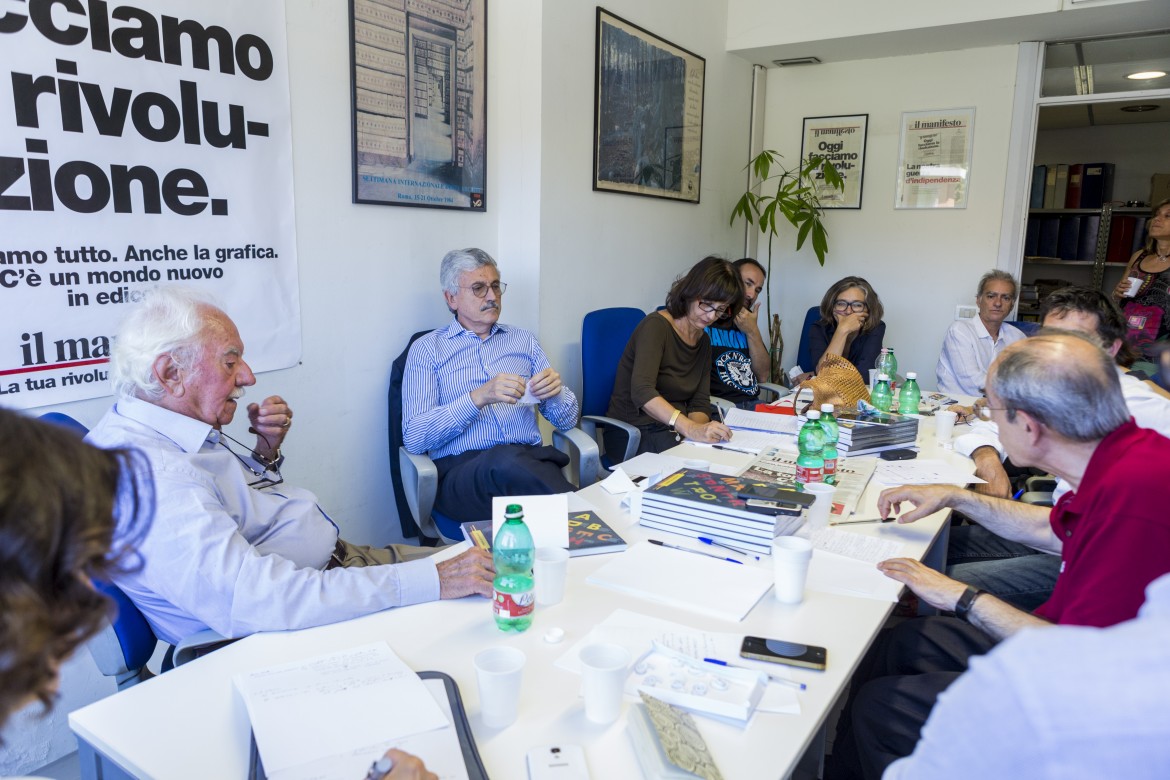
Editor’s note: For a long time, il manifesto has been working on the construction of a unity process of the left, sometimes even pushing its heart beyond the obstacle. We opened a broad and participatory debate, entitled “There is life in the left” to counter the painful compulsion of the “few but good,” that syndrome that pushes the Italian left to reproduce by fission, suffering one defeat after the other.
Sometimes it seems to be fighting a quixotic battle because in front of our divisions, on the one hand there is an aggressive right and the other a Renzi neocentrist Democratic Party: mildly liberal on civil rights, liberalist on social rights.
In this sensitive period before the forthcoming electoral storms, we try to figure out if the recent initiatives — the assembly of Teatro Brancaccio and the demonstration at Piazza Santi Apostoli — have had the effect of fencing and isolating the protagonists in the field, or if these events have been positive attempts to mix the view and broaden the horizon. —Norma Rangeri
IL MANIFESTO How feasible do you think, from one to ten, that in the next elections we will have a list of a leftist coalition that will win the consent of those millions of voters who do not vote anymore?

ANNA FALCONE Driven by the optimism of reason, I would answer eight out of ten chance. By opening a pluralistic debate, the different souls have been able to express, perhaps in a critical way, but still oriented towards convergence. Of course, now we have common positions. The appeal I signed with Montanari started from the need to give a positive answer to the title of the debate promoted by you: there is life in the left. Yes, there is so much that you cannot expect to organize it according to old patterns. There is a huge number of people who would like to vote for something serious on the left, not just a minor thing to serve as a crutch before or after the elections for something else that has nothing more to do with the left. For this reason, the program must be ambitious, capable of making a real upgrade to democracy.
We must become an adult political force that goes beyond making an alliance after the elections, but instead, aims to make a new horizon for this country. If this ambition is missing, it will be difficult, not because the will is lacking, but simply because we will not collect the consent of our potential voters.
The first objective is to involve everyone with a deal on an innovative program. I am optimistic about the will, and I would give it 8 out of 10 chances we will have this list. Anna Falcone
NICOLA FRATOIANNI We have to work hard to reach this target of one list to the left of the Democratic Party, today I would say that the chances are both zero and ten. I will explain. Around us, there is a very strong demand for a generalized unity. This time, they tell us, “please give us something to vote for, a unique thing, do not make us face the choice between two or even three options, which express unsatisfactory bias.”
At the same time, the same people ask us to do something serious, that is credible for a radical discontinuity with the past. I will not make an argument on what was done to distribute licenses, on the contrary I think some sort of mutual amnesty between us is needed: politics is not a fixed set of biographies.

But I will advance two points. The first: the social democratic left has done little on the way of reformism. Reformism has gradually become the opposite of what it was, that is, the gradual construction of an improvement in people’s lives, an expansion of rights. Every “reform” became instead the land on which to build regressive mediations.
The other issue is the government. The culture of government is increasingly confusing, namely the ambition to compete with the response to the complexity of the problems with the culture of being in the government, the idea that being in government is the end to which everything else is sacrificed, in the name of the lesser evil. Meanwhile the American primaries or Corbyn’s results in England tell us a different answer. A different answer that we have to have the strength to propose clearly, not just for the campaign, but also for after. I am not proposing to say “never a government alliance,” that would be nonsense. I think for example of the case of Padua, where the coalition mayor we supported, which has even made house with the PD’s winning candidate, it went very well. Because he has reconstructed a power relationship.
They ask us to vote for a single list but also for a radical discontinuity. As in Padua. If we do not achieve it, it will be a defeat for us all. Nicola Fratoianni
MASSIMO D’ALEMA We are lucky we have little time. This imposes choices on us. In all likelihood, we will have a proportional electoral law, with a minimum threshold that I hope will be challenging and, therefore, very useful for us to remove ambitions of separation. It would also be a way of making the voters face their responsibilities: do you want to change the trend to the left or not? I realize that there are fairly significant forces which policy issues converge. Based on this background, I think it’s only right, but also highly likely that we are headed toward a substantial list, that can aspire at exercising a real influence on Italian political life. This can only be done by achieving double digit results in an election.

Around this, there are a number of problems, some medium to long term, but equally important. Because when you start a trip, you have to have an idea of the route, not only the first milestone, which in our case are the elections. If we make an electoral coalition that falls apart in the aftermath of the vote, it will be the ultimate catastrophe for the Italian left. Whether we can prevent this, will depend on the manner in which certain conditions are set at the beginning. Making an electoral list is an operation to be conducted quickly, however, we are faced with a much larger issue, the problem of the reconstruction of the left far beyond the borders of our country.
The left has not recovered from the big crisis built in the West in the century behind us, the crisis of the nation state, social compromise, welfare. We now live in a completely different scenario, that of globalization and its crises. The right side often appears more compelling in responding to the great problem of our time, which is the need for people’s protection. The social base of the Left, the world of the weak, went the other way and not only in Italy.
If we want to think about the ambitious project of a large open force of the left, which also collects a part of the democratic Catholic world, we should not demonize the term “centerleft.” Of course it must not used to refer to the repetition of past experiences, but all the more now that Renzi leaves that flag in the mud in favor of a true centrist perspective, we have to pick it up. If we did not, we would give him a hand.
Fratoianni To elaborate upon your metaphor, I fear that the mud has irrevocably changed the centre-left flag. On this, I disagree with you.
D’Alema We need to reflect on this question, but it is not to agree more or less, it is like this. We must link a very close next election task, essential, with a medium long period of reflection on what is the left. With the aim of creating a strong political force, not only a list, certainly with new characters because we need to think and innovate on the party’s structure as well. We cannot just rely on invoking Corbyn.
The goal is a two digit consensus to show we can change things. But the real challenge for all is to involve young people in particular, and talk to the millions of people who no longer vote.
MAURIZIO ACERBO We work very hard so that there is a unified list on the left, we have been proposing it for years, but I do not know whether it is the same list D’Alema is thinking of.
In all European countries, there are pacifist, anti-capitalist and ecologist lists. In Italy, we do not have one, because the neoliberal ideology is so strong that many of those who should contribute with us to do what Podemos does in Spain, Syriza does in Greece and Mélenchon does in France, continue to think in terms of center-left.

The problems go a bit beyond the opposition to Renzi. I hope we can develop a major political force of the European center-left, but in Italy I see no Corbyn and no Sanders. People who become folk heroes because, for 30 years, they have lived up to the ideals of their youth in opposition to neoliberalism and war.
We must realize that Renzi is not the result of cynical and cheating fate, but it is the outcome of the Democratic Party’s journey, in that center-left that has not abolished the accumulation of life annuities nor has been able to accept Grillo’s challenge of nominating Stefano Rodotà as President of the Republic in 2013.
I do not agree with D’Alema, the social base of the left has not gone to the right, the leaders of the Left have gone the other way for that base. So, it is obvious that when the weakest, those who are at the bottom, have no reference points, they wander to all sides.
In the UK, the same people who had voted for Brexit, venting their social rage to the right, voted for Corbyn, moving the country’s axis to the left. Rifondazione Comunista and Sinistra Italiana should then work to build a large recognizable leftist political force. Also because if there weren’t a left different from that of Piazza Santi Apostoli, we would condemn people to choose between abstaining and voting for the 5 Stars Movement.
Was there a proposal for us to be an invisible spare tire to the Pisapia/Bersani project? No, thanks. After that I do not exclude that, like in Spain and Portugal, the left can then challenge the social democratic forces to govern together.
But after that it was able, like in Spain and Portugal, to build an independent perspective. I’m talking about political formations that have 20 percent.
D’Alema It is clear the way Acerbo conceives the unitary process: instead of a list, he wants to make two.

IL MANIFESTO To build a unitary process, everyone must be willing to question its own truth, not in the principles and values, but in programs. Otherwise, everyone thinks of making the revolution at its own home and meanwhile the country’s balances shift to the right.
You must be willing to put something in question, not the principles and values, but the programs, otherwise everyone remains by itself.
The recent discussion on the “flag” of the center-left shows that, contrary to what Fratoianni stated, actually the recent history, and even biographies, make the process unit arduous, much more than the discussion on the programs. The difference with D’Alema is the judgment of the center-left that was. It is true that such difficulties are amplified when the process is played only at the top level, but on the two occasions in which the pulse of the voters was tested, at Brancaccio and Santi Apostoli, no steps forward were achieved. So why not take advantage of the great opportunity presented by the election law. It is virtually certain it will be proportional electoral, at least with a high threshold in the Senate, can you make a proposal for unified leftist policy against Renzi and his semipersonal party? Without doubts or nuances. Maybe, the problem of the center will come later, or maybe never. It will be different if we can face it with a substantial electoral strength of a single unitary list as an alternative to the Democratic Party, let’s hope we can achieve it.
Falcone It is not a personal matter, Pisapia, Fratoianni or somebody else, but the people involved. Half of Italians have declined to participate in the democratic dynamic process, they reject the purely representative democracy. At this point, the first goal is to get them involved.
So, do we have the strength to build together a big national meeting, to convene a convention? It takes courage, credibility and a democratic method and it does not only come from the profiles, but the ability to make a pact, a strong bond to an innovative program.
Labor, environment, higher education and research, home, peace, universal income support. It is not impossible to have a clear and shared program.
Fratoianni My dissent with D’Alema on the left-center perhaps has also to do with the recent history but, in fact, I think if we go around the country asking who now governs us, the answer would be “the center-left.” Because Renzi has not given up on that word. He simply says, “I am the center-left,” or rather, “without me, there is no center-left.” In our country, there is no left worthy of the name.
Certainly, the first step is to begin the discussion about the program. Recently I wrote an open letter to Giuliano Pisapia, to which I received no reply. I did not get offended, but the dialogue is difficult in these circumstances. Booing MP Miguel Gotor at Brancaccio was certainly a big mistake and I cheered for the things he said, but the boos do not scare me because they occur in confrontation. I say we need to focus on the merits of the issues.
For example, if the debate on the electoral law is restarted, I think the left should fight for a proportional electoral law. At work, do we mean that we need to change the road and proposes the re-introduction and extension of Article 18 to everybody? Do we agree on a universal measure of income support? On the reduction of working hours? And then, about protection, what do we say about housing, health, school and university education?
From these issues, we can begin the effort to rebuild a point of view on the world. We may find that building a clear and shared program is much easier than expected. Or that there are no unsolvable differences between us but, at least in this case, we would know why it is not possible to agree on a unified list, which I would consider a defeat. One last thing to consider is the issue of leadership, which certainly comes up. We do not have a person that stands out for all to recognize; so, we have to find a democratic path to select it. I’m ready now to for all the necessary stages.
I hope for a challenging threshold barrier to help removing ambitions of separation. The goal is to create a political force, not an electoral cartel. Massimo D’Alema
D’Alema If we make a convention to discuss all these things, I am afraid that would be a very confusing event, it should be at least well prepared. As for MDP party, we have carried out this discussion extensively. We had a programmatic initiative and we have ideas we have already debated. I would like to say something about the profiles. Giuliano Pisapia was a congressman of Rifondazione comunista, the Milan mayoral candidate of the left (SEL) against the Democratic Party candidate whom he beat, if somebody should have objections to Pisapia it is me, not you.
Fratoianni I do not oppose this issue.
D’Alema Do we want to make a discussion about the center-left? We will do it. I am organizing a scientific conference on the subject, it will be a very significant and important.
Prof. ALBERTO ASOR ROSA This is usually said in retrospect.
D’Alema Then, I will do something that aspires to be significant and important, is that okay?
ASOR ROSA This is a departure from your dominant character tones, but we greatly appreciate it.
D’Alema Pisapia spoke in Piazza Santi Apostoli. He made a speech in which he said that he is for the restoration of Article 18 protecting the workers. That is contrary to the slogan “less taxes for all” because those who have more should pay more. He said that we must tax the estates, which often scares even the left.
His tone was certainly very clear, in saying that we need a break with the experience of these years. I think it is a good basis for discussion. I’m not anybody’s fan, I am critical even of D’Alema.
Asor Rosa We don’t believe it…
D’Alema Well, I am critical, moderately critical. But in any case, when we talk about Pisapia, we are not talking about a lurking fifth column of the reaction. The event at Santi Apostoli was not a huge demonstration, true, but on the other hand, it was organized in a few days for a July afternoon. But definitely, it made this project take a quantum leap, it was covered by newspapers and television news, it was presented to the wide public.
Pisapia noted that his initial idea of creating a force that could influence the Democratic Party through a coalition relationship is losing consistency. Consequently, he moves, and he said it clearly, toward the creation of a political force to compete with Renzi’s Democratic Party on the basis of a more advanced program. And we have many converging ideas on taxation, labor, Europe that need to be discussed further, I would add that we must have a strong proposal for the youth, those three million of young Italians that neither study nor work.
We have the elements on which to open a discussion in the country to compare a number of program points. I imagine promoting committees involving not only the participation of the political forces but also citizens and associations, I see no insurmountable cliffs along this path. It is better that the process starts with a manifesto of seven or eight points, maybe presented in a problem format, than with a national initiative which can instead be achieved at the end.
Meanwhile, no one has to stop in the organization of their forces, hoping that at some point we will decide to give them to a common force. We must give voters the idea of being able to build a political formation in double digits, with the power to make a change. Because people are not asking for the moon, they are asking that we’ll be able to implement some of our proposals. And they are no longer involved in politics. It is not that if we state “we are the left,” then everybody run behind our flags. In Genoa, only 35 percent of voters went to the polls and it went bad for us.
The perception of strength is essential, the attractiveness capability is proportional to the mass. It is a principle of physics but also of politics.

Berlusconi, Salvini and Grillo are declared opponents, Renzi must be unmasked. If he gets stronger in these elections, the left will be smashed for many years. Alberto Asor Rosa
ASOR ROSA The priorities now are more political than programmatic. Our main opponent is Matteo Renzi. More than Berlusconi, Salvini and Grillo who are declared opponents, Renzi should be unmasked instead. If he comes out the next elections strengthened, no trace will remain of all the speeches that we have heard for years.
To avoid this, there must be a unified list. Otherwise, the left will suffer a mathematical defeat. The problem of the program is important, but I would also say that even the formation of a unified electoral list is part of a strategic political program, it is not a separate thing that can be discussed separately or later. It does not work like that, just because we agree on everything, then we can make the unitary list, nor are we in England, where Corbyn’s Labor still represented a strong unitary component. We are in Italy and the clash’ conditions are much more complicated.
About the infamous center-left, I tell Fratoianni that in Italy there is no prospect of a government to work apart from the center-left. It’s mathematical. A single and separate left will never come to rule. Not choosing the path of a possible government is absolutely legitimate, even highly understandable, but it is another thing. And Renzi is the greatest enemy of the center-left, all he imagines, thinks and says is going in the opposite direction to the center-left.
D’Alema It is enough to see the recent attack on Prodi, and I would not follow Renzi in this path.
ASOR ROSA If we fight against Renzi, we need to strive for a different center-left. The question then is not whether we can do it with Renzi, this question obviously does not arise because it is impossible. The real question is whether defeating Renzi can move what is left of the Democratic Party to a center-left perspective.
Defeating Renzi should mean even recoup some of those forces to a center-left government.
If that is the case, we would only need to make a joint list with the maximum possible consensus. Not the totality. We have to believe there are those seven or eight things around which the discriminant are clear but inconclusive. I mean, even those who have reservations on this or that point, can be part of the perspective of the common electoral list. We have to have a sense of the opportunities and historical limits.

We need to be ready for any electoral law. Getting to double digits is survival condition. For the unitary list, I see five chances out of ten. Massimo Villone
Prof. MASSIMO VILLONE If the elections were held today, I tell you as a citizen voter, I would not vote for any of you. Because none of you convinced me, I wish it were clear. Of course, I hope that the situation will change in the short time we have. Going back to Norma’s original question, I’d say we have five chances out of ten to build this joint list, but if we do not achieve it by September-October, it means we won’t be able to do it. At that point, we will be already in the electoral battle.
I believe that in this country, there is a demand for the left, but that does not necessarily mean that there must be a political left that represents them. And a convention is not enough to solve this problem, there is nothing more deceptive than facing a few hundred or thousand enthusiastic.
The problem is always the millions who are out. I’m still trying to understand why Pisapia gave an assist to Renzi with the proposal to participate in new primaries, I personally am not so willing to set it aside. As well as his yes to the constitutional referendum in December.
D’Alema But Renzi said no to the proposed primaries.
Villone The issue is that Pisapia has proposed it to him. Are you saying he did it on purpose so Renzi would say no? If so, I’m not sophisticated enough. I add that the issue of the electoral law is not necessarily closed, we can well imagine one perfectly consistent with the findings of the recent constitutional judgements and homogeneous between House and Senate but that eliminates the left. We cannot hope that everything goes as we think it should go, and we must be prepared to survive any electoral law. Getting to the two digits is a condition of survival. But where are these votes? You can scrape something from the Democratic Party, but not much. And not many will be taken from M5S, I wish we did not rely on hope.
So, we should focus on young people and abstainees. We need to set up a targeted campaign. For example, Corbyn proposed to eliminate university tuition fees. It is not enough to say to the youth, “I’ll do something for you,” we have to build a credible proposal that says what, how and with what resources. Otherwise, they vote in protest for 5 Stelle. Even the abstention now is well established in Italy and it is not easy to convince one who has not gone to the polls in the last three or four elections, to go to the polls to vote for us.
Conclusion: we can not make a general election campaign with soft tones. We need specific and strong proposals and especially against the Democratic Party. Because the Democratic Party will inevitably campaign against us, the left.
There cannot be a political strategic agreement with anyone who is not an alternative to the Socialist Party. It is hard to think than just joining together we will beat Renzi. Maurizio Acerbo
Acerbo I agree with Asor that the joint list cannot be an element of the strategic political discourse.
Asor Rosa And that worries me a bit.
Acerbo Probably you are right to worry. Because from my point of view, there cannot be a political strategic agreement with anyone who is not an alternative to the European Socialist Party. It seems very unlikely that in Italy you can think of a confluence aiming only to beat Renzi. The effort was there, in the Brancaccio protest, but Pisapia responded that the conditions were not appropriate. I do not think his leadership can attract the young and the No voters, especially since he voted Yes.
I am worried because Fratoianni, Falcone and I risk losing more months and the possibility of creating a list of the left and movements that goes beyond 5 percent. And I want to say thank goodness that Mélenchon did not withdraw in France when Hamon asked him to. Today in Paris there are two groups to the left of the Socialist Party that have more congressmen than Mrs. Le Pen. They had the courage to bring forward a proposal for a left-left, that is what we should do in Italy.
The speakers
- Norma Rangeri (1951) is the Editor-in-Chief of il manifesto
- Massimo D’Alema (1949) is a former Prime Minister, congressman and Minister for Foreign Affairs. He has been national secretary of the Partito Democratico della Sinistra and was a founding leader of the Democratic Party, which he recently left for a new party, the MDP (Democratic and Progressive Movement). He is president of ItalianiEuropei.
- Nicola Fratoianni (1972), MP, is the national secretary of the Italian Left party (Sinistra Italiana).
- Anna Falcone (1972), a lawyer, is the vice-president of the Committe for No at the constitutional referendum.
- Maurizio Acerbo (1965), is the national secretary of the Communist Refoundation Party.
- prof. Alberto Asor Rosa (1933) is a columnist of il manifesto, professor of Italian Literature in Rome and writer.
- prof. Massimo Villone (1944), is a columnist of il manifesto and professor of Constitutional Law in Naples.
The conversation occurred in il manifesto newsroom in Rome, July 6th, 2017. Editing and condensing of the Italian text by Andrea Fabozzi, Matteo Bartocci and Micaela Bongi.
Originally published at https://ilmanifesto.it/la-nuova-sinistra-ce-manca-la-lista-il-forum-al-manifesto/ on 2017-07-08

